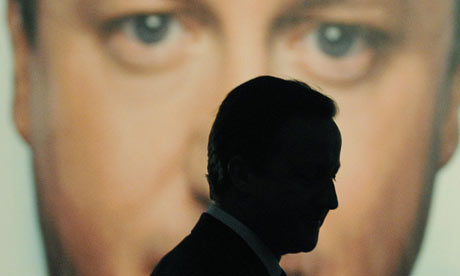Too soon to cut public spending, IMF warns
The IMF has backed Labour's approach in delaying cuts while the economy is emerging from recession
The International Monetary Fund today gave strong backing to the government's "wait-and-see" approach to cutting Britain's record peacetime budget deficit, warning that the weakness of growth required tax increases and spending cuts to be delayed until next year.

IMF stance on public spending contrasts with that of the Conservative party. Photograph: Stefan Rousseau/PA
In a rebuff to David Cameron's avowed intention to start repairing the public finances as soon as this spring's election is over, the Washington-based IMF said the fragility of the global economy meant stimulus packages should be left in place well into 2010.
The detailed study – Exiting from Crisis Intervention Policies – was published as data from the British Bankers' Association for January showed a dip in mortgage borrowing, a sharp drop in lending to businesses and a repayment of credit card debt for the 10th successive month.
"In general, fiscal and monetary stimulus may need to be maintained well into 2010 for a majority of the world's economies, including several of the largest, although the timing of the exit is likely to differ substantially across countries," the IMF said. It added that the recovery from the global economy's most severe downturn since the second world war had been stronger in the leading emerging economies such as India and China than it had been in the developed west.
In pre-election sparring over the economy, the chancellor, Alistair Darling, has been arguing that the Conservatives would jeopardise Britain's recovery prospects if they started to cut the budget deficit too soon.
Darling said: "The IMF's report is further evidence that David Cameron and George Osborne have neither the experience nor the judgment to be trusted with the economy. The IMF agreed the government's approach is the right one. The report confirms that doing what David Cameron suggests would wreck the recovery."
The IMF endorsed Darling's approach but stressed that action to reduce the deficit from the near-£180bn projected for the current financial year was inevitable and would be prolonged and painful.
Noting that the timing of withdrawal of the stimulus posed a difficult trade‑off, the IMF noted: "Unwinding public intervention too early could jeopardise progress in securing a sustained economic recovery, while maintaining intervention for too long could distort private incentives and pose risks to price, financial and fiscal stability.
"One of the key lessons from experiences of similar crises is that a premature withdrawal of policy stimulus can be very costly, particularly if the financial system is weak. Thus, in the current context, the potential risks associated with an early withdrawal of policy stimulus seem to outweigh the risks of maintaining it for longer than possibly needed."
The IMF said the crisis of the past two-and-a-half years had affected public finances across the globe in a way not seen since the second world war. In 2007, when the credit crunch began, 40% of countries sampled by the IMF were running budget surpluses, but by 2009 this had dropped to 10%. Countries with deficits higher than 3% of national output (gross domestic product) increased from 20% to 70%.
In advanced economies, the ratio of debt to GDP was projected to rise from 73% in 2007 to 109% in 2014, the highest it has been since the early 1950s.
Even so, it found no reason to tackle the deficits immediately. "For the global economy, with the exception of some countries, current conditions do not justify a significant rolling back of macroeconomic stimulus or financial policies in 2010. The recovery remains sluggish compared with past standards, at least in the advanced economies."
The IMF said economies would have large amounts of spare capacity for the next few years and unemployment was likely to remain high well into 2010. Government action has compensated for weak private demand, but the IMF saw little evidence of a strong rebound in consumer spending or corporate investment. "Fiscal and monetary stimulus may need to be maintained well into 2010, although if developments proceed as expected, withdrawal could begin in 2011."
Private demand was being held back by limited availability of credit, higher levels of household saving, persistent unemployment and income insecurity.
The IMF said policymakers should take action to reduce budget deficits before raising interest rates. "Achieving fiscal sustainability will be a difficult and prolonged process, making it imperative for consolidation to begin as soon as there is clear evidence of self-sustaining recovery, whereas monetary policy being generally more nimble can respond more flexibly to evolving macroeconomic conditions."
According to the IMF, cutting the budget deficit as growth accelerates would enable central banks to leave interest rates lower for longer, and it said the design and communication of strategies to ensure fiscal solvency were a "top priority".
The IMF also warned that countries such as Britain, which have propped up troubled banks, should be careful about withdrawing the support. "Unwinding the vast web of domestic and international crisis financial measures should be done gradually and cautiously and may take a considerable period of time," it said.

No comments:
Post a Comment